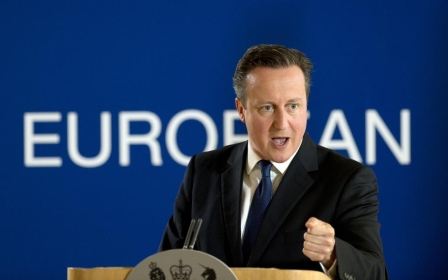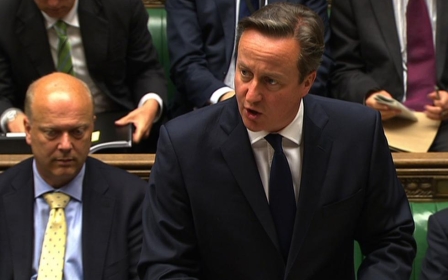Britain's secret Syria bombing: This political row is a side show

British media and politicians had a moment of hand wringing last week when it was discovered that UK military personnel were involved in missions against Islamic State (IS) targets in Syria. It was a very British argument about parliamentary scrutiny of military operations overseas, and an important one, but in the Syria context something was missing.
It's the first time in many months that Syria has made headlines in Britain, this despite the gruesome reality that in May and June up to 5,000 civilians were killed in the conflict - and a similar number of government and rebel troops. Go online and you can see the dead children killed by government bombs, or civilians and soldiers executed by IS. This unbelievable scale of horror - four Gaza wars in two months - does not even register in the UK news sphere.
After four years of a vicious civil war in which a quarter of a million people have died, four million have been forced to flee the country - twice as many as during the Iraq war - and nine million are internally displaced, yet this terrible war is no longer a story in the UK. Despite our fixation with IS, it is Syrian government bombing that has killed by far the most civilians - around 7,000 in the first six months of 2015 according to the Syrian Network of Human Rights, compared to 1,500 killed by militant groups, two thirds by IS. Coalition bombing has killed 102 civilians, reports SNHR.
It sometimes seems that when a story of conflict and suffering innocent people becomes too awful to bear, we simply stop talking or thinking about it. Except of course, when it somehow connects back to us. In this case, the revelation of non-authorised military flights has reignited a debate, if only in paler form, that occurred two years ago.
In September 2013 the British parliament voted down any involvement in the Syrian war following a chemical attack in Ghouta, near Damascus. There was profound unease about getting involved in another Middle East war after the deeply unpopular Iraq debacle. Further, the Syrian conflict had morphed from protests against a dictatorship into a multi-fronted civil war pitting regime forces against mostly Islamist militant rebels, many foreigners, who were seeking the creation of an Islamic state.
Impotent stance
The British government has long called for President Bashar al-Assad to step down - which is rather like me telling David Cameron to step down: unenforceable. Syria has long been viewed with suspicion by the West, as an ally of Iran and supporter of militant groups including Hezbollah, who have been resisting Western ally Israel's occupation and aggression.
For the British public, we don't seem to have a dog in the fight. Unlike Iraq, where the division was between pro and anti-war camps along clear lines - those supporting Bush and Blair's war against Saddam Hussein over his possession of non-existent WMDs, and those millions opposed - Syria does not create a clear political sympathy on either side. People look at the war, shake their heads in despair and carry on with their lives.
Assad's crackdown on protesters in 2011 was brutal, and the conflict appeared to quickly evolve into a sectarian war with forces on both sides committing atrocities. But as in other regional conflicts, distaste with brutal dictatorships does not automatically equate into support for those groups, mostly Islamist in makeup, who oppose them.
Assad is supported by some anti-imperialists and also those on the far right who over the years have drawn close to the Baathist state for its uncompromising and brutal approach toward Islamist opposition, exemplified in the Hama massacre of 1982.
But outside the small groups who take sides in the Syria conflict, and the NGOs who try to raise funds and awareness to help the millions of innocent refugees, the public has lost interest. The only time we hear about Syrians is in relation to the massive flow of refugees out of the eastern Mediterranean, as those fleeing the war try to reach Europe. At this point it becomes an immigration issue, with some saying we must take in more than the tiny handful of refugees we have taken so far, while others stick with the line that we are "full up" and that refugees should stay in the region in vast camps in Turkey, Lebanon and Jordan.
By contrast, neighbouring Muslim states have until recently opened their doors to refugees, while Europe has pulled up the drawbridge, even in the face of those who are drowning trying to get somewhere safe.
It's not about us
Fundamentally, we are only interested in the Middle East when it's about us. This is a tragic failure of politics and sympathy. What is it about our inability to care about finding a way to end this dreadful war? Is it just that we are suffering from Syria overload, or simply our imagination cannot take in the level of brutality and devastation? Or is it that in cold hard realpolitik, the current bloody stalemate suits our geopolitical interests?
There is an acceptance here of the need to fight Islamic State, especially since the Tunisian attacks. For this, there may be a limited will to engage with the Syrian conflict militarily - and for all we know, UK pilots were assisting the Kurdish People's Protection Units in northern Syria in their fight against IS.
A vote today would be about airstrikes against IS, as against the 2013 vote on the very different proposition of strikes against President Assad. Even so, if it were held in Parliament tomorrow, the outcome could well be similar to that in 2013. This is because regardless of the nature of the fight, British politicians and voters are suspicious of any military engagements in the Middle East, given how badly both Iraq and Afghanistan turned out. In Iraq, IS emerged from the ruins, in Afghanistan, the Taliban never went away.
Middle East Eye propose une couverture et une analyse indépendantes et incomparables du Moyen-Orient, de l’Afrique du Nord et d’autres régions du monde. Pour en savoir plus sur la reprise de ce contenu et les frais qui s’appliquent, veuillez remplir ce formulaire [en anglais]. Pour en savoir plus sur MEE, cliquez ici [en anglais].





